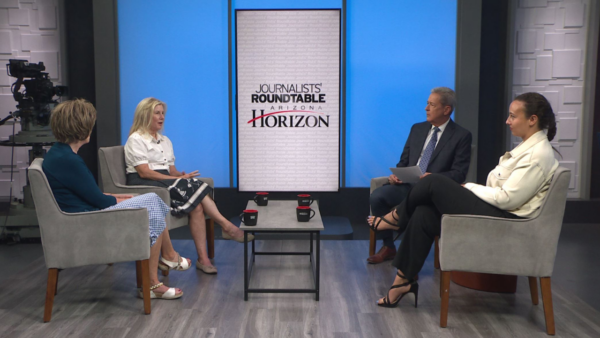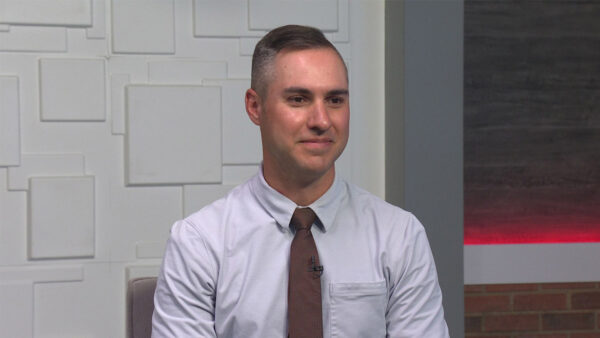Spring Training baseball is in full swing this month, and with half of Major League Baseball’s 30 teams, Arizona’s Cactus League is as strong as ever. But there was a time when Arizona might have lost the league if not for the actions of Governor Rose Mofford. Former Special Assistant to the Governor Geoffrey Gonsher and Cactus League historian Rodney Johnson tell us how Governor Mofford saved the Cactus League.
Ted Simons: Spring training baseball is in full swing this week. With 15 teams, Arizona's Cactus League is going strong. But there have been times when Arizona was in danger of losing the league. In a moment, we'll hear how Governor Rose Mofford stepped in to save spring training baseball back in the late '80s. As David Majure reports, it's a story that's part of an exhibit that reopened this past weekend.
David Majure: "Play ball: the Cactus League Experience," tells the history of spring training baseball in Arizona. The exhibit opened last year in the Mesa Historical Museum with Hall of Fame pitcher Gaylord Perry signing autographs to raise money for the project. Now the exhibit has a new home - in Mesa's Arizona Museum for Youth. The exhibit has doubled in size since it opened a year ago. So the two museums joined forces to give it a new larger venue. Ultimately, the plan is to create a museum dedicated entirely to Arizona baseball.
Unknown woman: Kind of like a Cooperstown west for Arizona.
David Majure: In the meantime, the "Play Ball" experience is open for business. Visitors can still peek through knot holes to see the evolution of Arizona's spring training ballparks, they can wander among photographs and memorabilia that trace the history of Arizona's Cactus League. Among new additions to the exhibit, how former Arizona Governor Rose Mofford helped save the Cactus League at a time when its future was uncertain.
Ted Simons: And joining me now for more on this is Geoffrey Gonsher, who served as a special assistant to Governor Rose Mofford. The Cactus League was one of his special projects. And Rodney Johnson, a Cactus League historian who's writing a book about the league, he's also president of the Arizona chapter of the Society for American Baseball Research. Good to have you both on the program. Let's talk about the state of the Cactus League when Governor Mofford took office. What were you looking at there?
Geoffrey Gonsher: When Governor Mofford took office the Cactus League was on the verge of unraveling. The state of Florida was attracting our teams, and we would have lost a major economic industry in the state of Arizona.
Ted Simons: Was the Cactus League just not being fully appreciated as far as an economic impact? What was going on here?
Geoffrey Gonsher: The state of Arizona did not recognize the cactus league at the time as an economic value to the state. Because of what Governor Mofford did, she was able to communicate that to baseball teams, the Major League Baseball, and the people of Arizona.
Ted Simons: How much was the state of the Cactus League impacting Arizona's efforts to get a major league baseball team here?
Rodney Johnson: Well, the profile of Arizona was greatly enhanced by the cactus league being here. All of the -- throughout the existence of the cactus league, people in cold weather country would pick up their morning papers and be shoveling snow, and see pictures of palm trees, and people playing baseball in Arizona with datelines like Mesa and Phoenix. And it raised the profile such that people started thinking of Arizona as a baseball place.
Ted Simons: Was the league, though, saying, or overtly or covertly, if you can't keep the Cactus League, we can't trust you with a team?
Rodney Johnson: There was certainly that sentiment out there. And I think that was one of Governor Mofford's biggest contributions, is she recognized that the Cactus League was more than just baseball, that it had such a great economic impact on Arizona.
Ted Simons: What did she do? What did the governor do to get this thing rolling and to get the Cactus League to where it is today?
Geoffrey Gonsher: The most important thing she did was to pull together a very strong Cactus League constituency that included all the cities, the teams, the mayors, the booster groups, and the fans. And she was ability to move force -- forward with a consolidated force to get things done.
Ted Simons: And this was a task force with ideas like taxing programs on tourists and these sorts of things this, is how these ideas got started?
Geoffrey Gonsher: Some of the revenue issues came from that task force. Other issues were that we needed to recognize the real value of Cactus League, and we hadn't done that previously.
Ted Simons: Was it -- were folks taken aback and the Cleveland Indians were a big impetus, because Florida decided they were going to make a push for them, and got them at the time. Did that wake everybody up, that particular team?
Geoffrey Gonsher: Absolutely. And the cubs were on the verge of leaving the Cactus League 20 years ago valued at $150 million a year for 30 days. That was bigger than most of the other industries in Arizona at the time.
Ted Simons: Compare and contrast the Cactus League with the Grapefruit League back then. Were we kind of the second fiddle to what they had going down there in Florida?
Rodney Johnson: Well, sure. We got -- had eight teams here, and the remaining teams, 24, I believe at the time, were in Florida. And so we were always the small guy, the small fry. In fact, the Cactus League didn't even grow to eight teams until 1969, from '47 to '69, they were just growing up and they stabilized in '69. And then 20 years later, we almost lost all the teams that we had.
Ted Simons: And I remember a time, correct me if I'm wrong, but didn't the Angels train actually in Palm Springs?
Rodney Johnson: The Angels were in Palm Springs. We had the Padres in Yuma, we had -- we ended up with two teams -- three teams in Tuscon, and now all those teams are consolidating, everyone is moving to the Valley, and that's one of the most attractive things about the Cactus League, is the proximity of the teams to one another. We're going to have all 15 teams next year training right here in the valley.
Ted Simons: And that again was helped along by the Governor's actions back there. How much did she push on this?
Geoffrey Gonsher: She pushed very hard. She went directly to the Commissioner of Baseball, and the Commissioner of Baseball supported her position.
Ted Simons: And I was asking earlier about how important it was to show the cactus league was viable in order to get a Major League franchise, which happened, 10, eight, seven whatever it is years later. It was a factor, wasn't it?
Geoffrey Gonsher: It was a major factor. The governor was told if we could not keep Cactus League baseball, we were not entitled to a Major League team.
Ted Simons: Did that kick some rear ends around here a little bit, that information?
Geoffrey Gonsher: That caused a lot of people to rethink the issue, that's for sure.
Ted Simons: The stadium district, the taxing authority, and all these things, matching funds to build stadiums. How difficult was that to get those laws passed?
Geoffrey Gonsher: It's always difficult to get a law passed, but because of Governor Mofford's personality and influence, and the respect people had for Governor Mofford, people were responsive to what she wanted to get done.
Ted Simons: And we've got the Cactus League again doubled now in the next 18 years. To what it is right now, where the cactus league now is considered -- is the Cactus League top dog over the Grapefruit League?
Rodney Johnson: I think so. Half the teams are training in Florida, half in Arizona, but I can see us getting a couple more teams here. I think Minnesota and Houston are both prime targets.
Ted Simons: Houston, huh? That's interesting. I heard Minnesota, didn't hear Houston. Prime targets, yet Florida is eyeing the Cubs and eyeing them big-time. What do you make of this controversy with the Cubs perhaps playing Naples off Mesa?
Rodney Johnson: Well, I think that it would be short sight first degree we would let the Cubs get away and go to Florida. I know that there's a lot of financing issues still up in the air about getting the Cubs stadium, but all the teams should be lining up behind keeping the cubs here. It would be like the American league saying we'll let the Yankees go to the other league. The Cubs are the anchor of the Cactus League, and attendance doubles every time they come to play in the team stadium here now.
Ted Simons: What do you make of this controversy with the Cubs? How do you think the governor, Governor Rose Mofford, would have handled this?
Geoffrey Gonsher: The governor has already expressed her opinion, and what she has said is this is a state of Arizona issue. Everybody, every team ought to be working together.
Ted Simons: Does this particular controversy signal trouble for the Cactus League?
Geoffrey Gonsher: Absolutely. Because if the organization cannot work together, if there's conflict within the Cactus League itself, then some of the teams may decide to leave.
Ted Simons: Quickly, Cactus League in trouble? Is this an indication of trouble for the league?
Rodney Johnson: I think it could be deep trouble sign to let the anchor team leave would not be a strong move, of course.
Ted Simons: All right. Gentlemen, thank you so much for joining us. We appreciate it.
Geoffrey Gonsher: Thank you.
Rodney Johnson: Thank you, Ted.
Geoffrey Gonsher:Former Special Assistant to the Governor;Rodney Johnson:Cactus League historian;























